Tzipi Livni
| Tzipi Livni | |
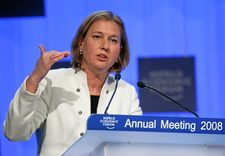 |
|
|
Leader of the Opposition
|
|
| Incumbent | |
| Assumed office 2009 |
|
| President | Shimon Peres |
|---|---|
| Prime Minister | Benjamin Netanyahu |
| Preceded by | Benjamin Netanyahu |
|
Minister of Foreign Affairs
|
|
| In office 2006–2009 |
|
| Prime Minister | Ehud Olmert |
| Preceded by | Silvan Shalom |
| Succeeded by | Avigdor Lieberman |
|
Minister of Justice
|
|
| In office 2006–2007 |
|
| Prime Minister | Ehud Olmert |
| Preceded by | Meir Sheetrit |
| Succeeded by | Daniel Friedmann |
|
Minister of Agriculture
|
|
| In office 2002–2003 |
|
| Prime Minister | Ariel Sharon |
| Preceded by | Shalom Simhon |
| Succeeded by | Yisrael Katz |
|
Minister of Immigrant Absorption
|
|
| In office 2003–2006 |
|
| Prime Minister | Ariel Sharon Ehud Olmert |
| Preceded by | Ariel Sharon |
| Succeeded by | Ze'ev Boim |
|
Minister of Housing and Construction
|
|
| In office 2004–2005 |
|
| Prime Minister | Ariel Sharon |
| Preceded by | Effi Eitam |
| Succeeded by | Issac Herzog |
|
Member of the Knesset
|
|
| Incumbent | |
| Assumed office 1999 |
|
|
|
|
| Born | 8 July 1958 Tel Aviv, Israel |
| Political party | Kadima (since 2005) Likud (To 2005) |
| Spouse(s) | Naftali Spitzer |
| Children | Omri Spitzer Yuval Spitzer |
| Religion | Judaism |
| Military service | |
| Allegiance | |
| Service/branch | Israel Defense Forces |
| Rank | Lieutenant |
| Unit | Officer School |
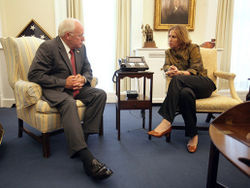
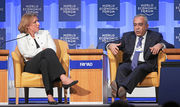
Tzipora Malka "Tzipi" Livni (Hebrew: ציפורה מלכה "ציפי" לבני, born 8 July 1958) is an Israeli politician, the current Israeli Opposition Leader[1][2] and leader of Kadima, the largest party in the Knesset. Raised an ardent nationalist, Livni has become one of her nation's leading voices for the two-state solution. In Israel she has earned a reputation as honest, clean, and sticking to her principles.[3][4][5][6][7] She is the first woman to be leader of the opposition in Israel.[8]
Contents |
Biography
Born in Tel Aviv,[9] Livni is the daughter of Eitan Livni (born in Poland) and Sara Rosenberg, both prominent former Irgun members.[10] Her father served as the chief operations officer of the Irgun. Tzipi Livni served as a lieutenant in the Israel Defense Forces (IDF).[11] According to an interview in Yediot Aharonot, described in The Sunday Times, she served in the elite Mossad unit responsible for Operation Wrath of God (also known as Bayonet) in the 1980s.[12] She resigned from the IDF in August 1983 to marry and finish her law studies.[13] A graduate of Bar-Ilan University's Faculty of Law, she has practiced public and commercial law for 10 years.[14] Livni resides in Tel Aviv; she is married to advertising executive Naftali Spitzer and has two children, Omri and Yuval. Livni has been a vegetarian since the age of 12.[15] Besides her native language, Hebrew, Livni also speaks English and French.[16]
Political career
Early career
Livni entered politics in 1996 when she tried to win a spot on Likud's list to the Knesset. She was not elected to the knesset, but was appointed as head of the government-owned corporations authority in Netanyahu's government and oversaw the privatization of a number of companies. Livni was first elected to the Knesset as a member of the Likud party in 1999. When Likud leader Ariel Sharon became prime minister in July 2001, Livni was appointed Minister of Regional Co-operation, and thereafter held various Cabinet positions including Minister of Agriculture and Rural Development, Minister of Immigrant Absorption and Minister of Housing and Construction.[17] She received the Abirat Ha-Shilton ("Quality of Governance") award for 2004. On 1 October 2005, she was appointed Minister of Justice after several months acting in that position.[18]
In Sharon's Cabinet, Livni was an avid supporter of the prime minister's disengagement plan and was generally considered to be among the key dovish or moderate members of the Likud party. She often mediated between various elements inside the party, and made efforts to achieve a two-state solution to the Israeli-Palestinian conflict, including successful efforts to have the pullout from the Gaza Strip ratified by the Knesset. On 12 November 2005, she spoke at the official yearly commemoration of Yitzhak Rabin's assassination.[19]
Joining Kadima
On 20 November 2005, Livni followed Sharon and Ehud Olmert into the new Kadima Party. Ahead of the 28 March elections Livni was appointed to be the new Foreign Minister, while continuing to serve as Justice Minister, as a result of the mass resignation of Likud Party members from the government.[20]
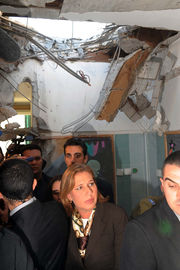
In the selection of candidates for the March 2006 Knesset election, Livni was awarded the number three position on Kadima's list of candidates, which effectively guaranteed her election to the Knesset.[21]
On 4 May 2006, with the swearing-in of the 31st Government, Livni became Vice (or Deputy) Prime Minister and retained the position of Foreign Minister. She ceased serving as Justice Minister at that time, but again held that position from 29 November 2006 to 7 February 2007, while still serving in her primary role of Foreign Minister.[21]
After the March 2006 Knesset election, Livni was described as "the second most powerful politician in Israel".[22] Livni is the second woman in Israel to hold the post of foreign minister, after Golda Meir. In 2007, she was included in the Time 100 Most Influential People in the World.[23] Forbes ranked her the 40th most powerful woman in the world in 2006,[24] 39th in 2007,[25] and 52nd in 2008.[26]
Livni became the first Israeli cabinet minister to explicitly differentiate Palestinian guerrilla attacks against Israeli military targets from terrorist attacks against civilians. In an interview on the US television news show Nightline, recorded on 28 March 2006, Livni stated, "Somebody who is fighting against Israeli soldiers is an enemy and we will fight back, but I believe that this is not under the definition of terrorism, if the target is a soldier."[27]
In 2007, she met with Palestinian Prime Minister, Salam Fayyad, to discuss "improving the lives of the Palestinian people, without compromising Israel's security."[28]
On 2 May 2007, Livni called for Olmert's resignation in the wake of the publication of the Winograd Commission's interim report. She offered herself as leader of Kadima if Olmert decided to step down and asserted her confidence in her ability to defeat him in a party election should he decline.[29][30] However, her call was ignored by Olmert and her decision to stay in the Cabinet sparked some controversy.[31]
As foreign minister, Livni won the admiration of European colleagues, who cite her lawyerly logic and pragmatism.[6][32]
In 2008, Livni condemned a photomontage of Pope Benedict XVI with a swastika displayed on his chest which was published on a website run by supporters of her Kadima party.[33]
Kadima leadership and Prime Minister-designation
In the Kadima leadership election held on 17 September 2008, Olmert decided not to stand for re-election as party leader and stated he would resign as Prime Minister following the election. Livni and Shaul Mofaz emerged as the main rivals for the leadership.[34] Livni won the Kadima leadership election by a margin of just 431 votes (1%).[35][36] Palestinian peace negotiators were reportedly pleased with the result.[37]
Upon declaring victory in the leadership election, Livni said the, "national responsibility (bestowed) by the public brings me to approach this job with great reverence."[38]
On 21 September 2008, Olmert formally resigned his office in a letter submitted to President Shimon Peres, and the following day Peres formally asked Livni to form a new government.[39][40] Livni faced tough negotiations with Kadima's coalition partners, particularly the Shas party, which had set conditions for joining a Livni government.[41][42][43] Likud, the main opposition party, lobbyied Shas and other parties seeking to bring about that result.[44]
2009 elections
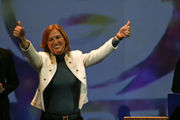
In February 2009 Israel held elections for the national parliament, the Knesset. Livni, foreign minister and head of the Kadima party, campaigned against Benjamin Netanyahu of the Likud party to lead the new government. While election results gave Kadima the most seats in the Knesset, parties to the right in Israel's political spectrum gained enough seats that a coalition government under Kadima leadership was unlikely. As a result, Israeli president Shimon Peres asked Netanyahu and Likud (which received one less seat than Kadima in the elections) to form a government; this is the first time in Israel's history that the party with the most seats was not asked to govern.[45]
Although it expressed some doubts, the influential Haaretz newspaper endorsed Livni for prime minister.[46]

When Livni was tapped to form the next governing coalition, Palestinian political analyst Mahdi Abdel Hadi said that Livni has been received warmly in the Gulf and that she is the leader most Arabs want to see as Israel's next prime minister.[47] During 2009 general elections, Arab media depicted her very negatively but as the lesser of the evils.[48][49][50]
Opposition leader
After an internal Foreign Ministry document stated that some European Union countries were considering freezing a planned upgrade in relations with Israel, Livni, as opposition leader, wrote in the message addressed to EU foreign policy chief Javier Solana, the EU's external relations commissioner Benita Ferrero-Waldner, and the EU's current council president, Czech foreign minister Karel Schwarzenberg. "You all know my commitment to peace between Israel and its neighbors and to the two-state solution, a commitment shared with the majority of the Israeli public," the opposition chief said. "I believe that this kind of attitude, one which directly links an upgrade in relations with regional diplomatic progress, is overlooking the substantial gains that the upgrade could provide both to the people of Israel and the people of Europe."[51]
On May 25, 2009, Livni told Harvard University students: "On the Iranian issue, there is no opposition or coalition in Israel."[52]
Prior to Lebanon's 2009 general elections (and its inclusion of Hezbollah), Livni "acknowledged an important principle" from U.S. President Barack Obama's then-recent speech in Cairo that “Elections alone do not make true democracy.” She explained her position in a New York Times op-ed by alluding to her experience as Israel's justice minister as Hamas participated in Palestinian elections in 2006: "At the time, the counterargument was that the very participation in elections would act as a moderating force on extremist groups. With more accountability, such groups would be tempted to abandon their militant approach in favor of a purely political platform. But this analysis ignored the possibility that some radical groups sought participation in the democratic process not to forsake their violent agenda but to advance it." Livni advocated that "the international community must adopt at the global level what true democracies apply at the national one — a universal code for participation in democratic elections. This would include requiring every party running for office to renounce violence, pursue its aims by peaceful means and commit to binding laws and international agreements." She added that "The intent here is not to stifle disagreement, exclude key actors from the political process or suggest that democracy be uniform and disregard local cultures and values."[53]
Livni voiced support for Israel's gay community ahead of Gay and Lesbian Pride Month in June 2009. She addressed an event held at the gay community's municipal center in Tel Aviv's Meir Park.[54][55] After a 1 August 2009 attack on a gay youth center that left 2 people dead and 15 people wounded in Tel Aviv, Livni, who is in contact with the gay and lesbian community, said "This event should shake up society, and all the circles inherent in it, including the political establishment and the education system, and on this day deliver an unequivocal message against intolerance, incitement and violence, and to act against any manifestation of these." She attended a rally near the location of the attack along with hundreds of Israelis and some other politicians and urged Israel's gay and lesbian community to continue living their lives, despite the "hate crime."[56]
Livni opposed Netanyahu's land reform bill.[57]
On 8 October 2009, Livni was honored as a by Yale University as a Chubb Fellow for her work and the inspiration spurred by her activities. She is the third Israeli leader to receive this honor after Shimon Peres and Moshe Dayan. The list also includes former US President Jimmy Carter and Bill Clinton. Livni referred to the Goldstone Report accusing Israel of committing war crimes in Gaza and said there was a huge ethical gap between those seeking to murder children in their homes and those unintentionally harming civilians used by terrorists as human shields. Addressing the peace process, she said Israel is not involved in it as a favor to anyone, but that it is in the interest of all parties. At her next top in Miami, Livni will become the first Israeli woman to receive the International Hall of Fame Award from the International Women's Forum.[58][59]
As opposition leader, Livni noted in a 2009 Knesset speech that she herself did not support Yitzhak Rabin's policies at the time. "The dispute is around the question of whether you can have it both ways – maintaining Israel as a Jewish state and keeping the entire Land of Israel," she said.[60] Political analysts see Livni's speech at the 2003 commemoration rally for Rabin as a turning point in her political career when she became more popular among the Israeli peace camp. She delivered a speech which many found deeply moving in which she said the day Rabin was murdered was "the day that the skies fell down on me because of what happened to us, to all the citizens of Israel." As foreign minister, Livni would again attend the memorial for Rabin in 2009. Labor Party officials were not keen on this idea, fearing that her appearance would cost them votes. Some Kadima officials also seemed reluctant, fearing her appearance at left-wing event would send some votes Likud's way.[61] Livni attended the memorial for Rabin in 2009.[62]
After a draft document authored by Sweden, the current holder of the rotating EU presidency, surfaced that calls officially for a division of Jerusalem and implies that the EU would also recognize a unilateral Palestinian declaration of statehood, Livni wrote a letter to Swedish Foreign Minister Carl Bildt, saying it was "wrong and not helpful," and that she conveyed "deep concern regarding what appears to be an attempt to prejudge the outcome of issues reserved for final status negotiations." European efforts to "dictate for either party the nature of the outcome on the status of Jerusalem," she said, would only serve to endanger the fulfillment of "our shared vision of two states for two peoples into a reality."[63] Livni also called on France to speak up against the draft during her meeting with Sarkozy in Paris.[64]
In December 2009, Livni travelled to Paris and met with President Nicolas Sarkozy. "Time is against us," she told reporters following talks at the Elysee palace that also touched on Iran. "We discussed the need to re-launch the peace process between Israel and the Palestinians and I believe that this is part of Israel's interest to relaunch the negotiations from the point at which we stopped basically a year ago."[65]
Criticism
During the 2008–2009 Israel–Gaza conflict, Livni was criticized by Arab League Chairman Amre Moussa as, "I am greatly surprised by, and I reject, the words of the Israeli foreign minister (Livni), who asks: 'Is there a humanitarian crisis? There is no humanitarian crisis in Gaza.' "[66] Livni was quoted as saying "Israel has been supplying comprehensive humanitarian aid to the Strip... and has even been stepping this up by the day."[67] Israel would later allow a daily three-hour truce during the offensive to enable aid to flow through a humanitarian corridor.[68]
UK arrest warrant
In December 2009 a warrant for Livni's arrest was understood to have been issued by a London court at the weekend following an application by Palestinian activists, focused on Livni's role in Israel's war against Hamas-run Gaza at the turn of the year. It was withdrawn after she cancelled her visit. For several years Palestinian activists have made largely unsuccessful attempts to prosecute Israeli officials in European courts under the universal jurisdiction system.[69] The warrant was issued on 12 December and revoked on 14 December 2009 after it was revealed that Livni had not entered British territory.[70]
Israeli government experts on international law have advised cabinet ministers with a security background and senior IDF officers not to visit Britain, Spain, Belgium or Norway because in these countries they risk being arrested on charges of alleged war crimes through “universal jurisdiction” laws.[71] The warrant was later denounced as "cynical" by the Israeli foreign ministry.[72]
British Foreign Secretary David Miliband contacted Livni and his Israeli counterpart Avigdor Lieberman to formally explain the incident on behalf of the British government.[73] Secretary Miliband had expressed concern at the situation and said officials were looking "urgently at ways in which the UK system might be changed in order to avoid this sort of situation arising again". Judges in the United Kingdom can issue arrest warrants for war crimes suspects around the world under the Geneva Convention Act 1957, without any requirement to consult public prosecutors—something Miliband said was "unusual". Foreign Office minister Ivan Lewis, also Jewish and former Vice-Chair of Labour Friends of Israel, said Wednesday that Britain was "absolutely determined to make sure that this can never happen again". "Because Israel is a strategic partner and close friend of the UK, it is absolutely essential representatives of the state of Israel can visit Britain freely to talk about the Middle East peace process," he told the BBC.[74] J Street applauded Milibrand's rejection of the warrant and "his promise to pursue a change in the law that would prevent unfortunate events like these from happening in the future."[75]
Prime Minister Gordon Brown expressed his regret over the warrant and broke off from climate talks in Copenhagen to call Livni and reassure her that she was "most welcome in Britain any time." According to a statement released by Livni's office, Brown also promised to seek legislative changes to ensure no Israeli official would risk arrest while on British soil. Livni replied by saying: "The situation must be repaired immediately."[76]
Yehuda Blum, Israel's former ambassador to the United Nations and a professor of law at Hebrew University of Jerusalem commented: "The abuse and misuse of this concept of universal jurisdiction should be discontinued." Blum said the law was intended for use in cases with no clear jurisdiction, such as piracy in international waters, and should not be expanded for political aims. Israeli officials, acting under orders from Prime Minister Benjamin Netanyahu, told the British ambassador they expect quick action to change the law. In London, chagrined British officials said they were seeking solutions.[77]
Livni called the arrest warrant "an abuse of the British legal system".[78] At a security conference in Israel, Livni did not directly address the arrest warrant but defended Israel's conduct during Operation Cast Lead, saying she "would make the same decisions all over again". "When the state of Israel has to do the right thing, it has to be done – condemnation or no condemnation, statements or no statements, arrest warrants or no arrest warrants. "This is the role of leadership, and as far as I’m concerned I would repeat each and every decision."
References
- ↑ Government 31 The Knesset
- ↑ "Kadima Party". http://www.jewishvirtuallibrary.org/jsource/Politics/sharonnewparty.html. Retrieved 2007-05-06.
- ↑ Israel's crisis of leadership – latimes.com
- ↑ Westcott, Kathryn (2007-05-02). "Middle East | Tzipi Livni: Israel's 'Mrs Clean'". BBC News. http://news.bbc.co.uk/2/hi/middle_east/6615687.stm. Retrieved 2010-04-25.
- ↑ "Livni, don't give in – Haaretz – Israel News". Haaretz. http://www.haaretz.com/hasen/spages/1066568.html. Retrieved 2010-04-25.
- ↑ 6.0 6.1 McGirk, Tim (2008-06-05). "Israel's Mrs. Clean". Time.com. http://www.time.com/time/magazine/article/0,9171,1812071,00.html. Retrieved 2010-04-25.
- ↑ Isabel Kershner (October 26, 2008). "As Israeli Elections Are Called, Livni Is Assessed". New York Times. http://www.nytimes.com/2008/10/27/world/middleeast/27israel.html.
- ↑ "LA Times Mobile". Mobile.latimes.com. http://mobile.latimes.com/inf/infomo?view=World+News+Item&feed:a=latimes_1min&feed:c=worldnews&feed:i=51829758&nopaging=1. Retrieved 2010-04-25.
- ↑ Verma, Sonia (2007-05-02). "Next in Line". Times (London). http://www.timesonline.co.uk/tol/news/world/middle_east/article1733971.ece. Retrieved 2007-05-06.
- ↑ News in Brief Haaretz
- ↑ "Knesset Member, Tzipi Livni". Knesset.gov.il. http://www.knesset.gov.il/mk/eng/mk_eng.asp?mk_individual_id_t=213. Retrieved 2010-04-25.
- ↑ Mahnaimi, Uzi (2009-02-15). "Looking for love: Livni the lonely spy". The Sunday Times (London). http://www.timesonline.co.uk/tol/news/world/middle_east/article5733800.ece. Retrieved 2009-02-20.
- ↑ "Livni's past in Mossad not spectacular". Jerusalem Post. http://www.jpost.com/servlet/Satellite?cid=1215331060828&pagename=JPost%2FJPArticle%2FShowFull. Retrieved 2008-07-22.
- ↑ "Tzipi Livni Knesset Biography". Knesset. http://www.knesset.gov.il/mk/eng/mk_eng.asp?mk_individual_id_t=213. Retrieved 2007-05-06.
- ↑ Cohen, Roger (2007-07-07). "Her Jewish State". New York Times. http://www.nytimes.com/2007/07/08/magazine/08livni-t.html?pagewanted=5&ei=5088&en=d8b4df055b5d201f&ex=1341547200&partner=rssnyt&emc=rss. Retrieved 2007-08-07. "Mirla Gal, who would reach the top of the Mossad during a 20-year career, met Livni in first grade. [...] “We were curious because her world wasn’t ours,” Gal said over lunch at a beachfront Tel Aviv restaurant. “Even then she was principled. When I was 12, she turned vegetarian and has been ever since.”"
- ↑ Tzipi Livni Knesset website
- ↑ "Tzipi Livni Government Roles". http://www.knesset.gov.il/mk/eng/mk_eng.asp?mk_individual_id_t=213. Retrieved 2007-05-06.
- ↑ Behind the Lines: And who, may we ask, is Tzipi Livni? Jerusalem Post. Retrieved 30 April 2007.
- ↑ Cohen, Roger (2007-07-08). "Her Jewish State". The New York Times. ISSN 0362-4331. http://www.nytimes.com/2007/07/08/magazine/08livni-t.html?pagewanted=8&_r=4&ref=magazine. Retrieved 2008-09-16.
- ↑ Macintyre, Donald (2008-08-02). "Tzipi Livni: Agent of change". The Independent (London). http://www.independent.co.uk/news/people/tzipi-livni-agent-of-change-883276.html. Retrieved 2008-09-16.
- ↑ 21.0 21.1 "Tzipi Livni (1958– )". Jewish Virtual Library. http://www.jewishvirtuallibrary.org/jsource/biography/TLivni.html. Retrieved 2008-09-16.
- ↑ "Tzipi Livni Named Vice Premier in Israel". Washington Post. http://www.washingtonpost.com/wp-dyn/content/article/2006/05/01/AR2006050100298.html. Retrieved 2007-04-30.
- ↑ Condoleezza Rice (2007-05-03). "Tzipi Livni". Time. http://www.time.com/time/specials/2007/time100/article/0,28804,1595326_1615513_1614647,00.html. Retrieved 2007-06-10.
- ↑ #40 Tzipora Livni Forbes, 31 August 2006
- ↑ The 100 Most Powerful Women Forbes, 30 August 2007
- ↑ The Most Powerful 100 Women sorted by rank Forbes, 27 August 2008
- ↑ Journal of International Criminal Justice Advance Access published online on December 15, 2006, Oxford University press, The Multifaceted Criminal Notion of Terrorism in International Law by Antonio Cassese
- ↑ Benn, Aluf (2007-07-08). "Livni and Fayad meet, discuss improving Palestinians' lives". Haaretz. http://www.haaretz.com/hasen/spages/879606.html. Retrieved 2008-09-16.
- ↑ Olmert's Survival Prospects Dim Amid Livni Challenge Bloomberg, 3 May 2007
- ↑ "'I have the qualifications to be PM'". Jerusalem Post. 2008-07-29. http://www.jpost.com/servlet/Satellite?cid=1215331132203&pagename=JPost%2FJPArticle%2FShowFull. Retrieved 2008-07-29.
- ↑ Verter, Yossi; Mazal Mualem (2007-05-02). "PM Olmert to tell deputy Livni: Stop undermining me, or resign". Haaretz. http://www.haaretz.com/hasen/spages/854647.html. Retrieved 2008-09-16.
- ↑ Israel Faces a Hard Sell in Bid to Shift Policy
- ↑ (AFP) – Oct 20, 2008 (2008-10-20). "Israel FM slams swastika image of Pope". Afp.google.com. http://afp.google.com/article/ALeqM5iLPD0AA0K2MkYxznNxSHW4MXQYKg. Retrieved 2010-04-25.
- ↑ Somfalvi, Attila (2008-08-01). "Poll: Livni beats Netanyahu, who beats Mofaz". Ynetnews. http://www.ynetnews.com/articles/0,7340,L-3576298,00.html. Retrieved 2008-08-02.
- ↑ "Livni to lead Israel ruling party". BBC News. 2008-09-18. http://news.bbc.co.uk/1/hi/world/middle_east/7620215.stm. Retrieved 2008-09-18.
- ↑ Hider, James (2008-09-27). "New Golda Meir’ Tzipi Livni wins election to be Prime Minister after extra time". The Times (London). http://www.timesonline.co.uk/tol/news/world/middle_east/article4776486.ece. Retrieved 2008-09-17.
- ↑ "Livni Set to Be Israel's P.M. – Video Library – The New York Times". Video.nytimes.com. http://video.nytimes.com/video/2008/09/17/world/1194817120919/livni-set-to-be-israel-s-p-m.html?scp=1&sq=livni&st=cse. Retrieved 2010-04-25.
- ↑ Livni declared winner of Kadima election ABC 18 September 2008
- ↑ Olmert formally submits his resignation to Peres Haaretz, 21 September 2008
- ↑ Peres entrusts Livni with forming gov't The Jerusalem Post, 23 September 2008
- ↑ Israel's Livni now in battle for premiership 1AFP, 7 September 2008
- ↑ Shas: If Livni wants a coalition, she must fulfill our demands Haaretz, 18 September 2008
- ↑ Livni offers Barak 'full partnership' in new gov't Haaretz, 22 September 2008
- ↑ Netanyahu asks Shas to back bid for early general elections Haaretz, 22 September 2008
- ↑ "Netanyahu urges moderates to join broad government". International Herald Tribune. Associated Press. 2009-02-20. http://www.iht.com/articles/ap/2009/02/20/news/ML-Israel-Politics.php. Retrieved 2009-02-23.
- ↑ "Livni is the preferred candidate". Haaretz. 2009-02-10. http://www.haaretz.com/hasen/spages/1063037.html.
- ↑ "¥T The Players of World War 3: Tzipi Livni -The Mossad Graduate ¥T". YouTube. 2008-09-18. http://www.youtube.com/watch?v=H_YaUZDJSiU&feature=channel_page. Retrieved 2010-04-25.
- ↑ "Arabs watching the Israeli elections | Marc Lynch". Lynch.foreignpolicy.com. http://lynch.foreignpolicy.com/posts/2009/02/10/arabs_watching_the_israeli_elections. Retrieved 2010-04-25.
- ↑ "Arab media declares early Israel election victory for 'extreme right' – Haaretz – Israel News". Haaretz. http://www.haaretz.com/hasen/spages/1063157.html. Retrieved 2010-04-25.
- ↑ "Arab media: 'Which extremist will Israel elect?' – Israel News, Ynetnews". Ynetnews.com. 1995-06-20. http://www.ynetnews.com/articles/0,7340,L-3669604,00.html. Retrieved 2010-04-25.
- ↑ "Livni urges EU: Don't halt EU-Israel relations upgrade – Haaretz – Israel News". Haaretz. http://www.haaretz.com/hasen/spages/1080649.html. Retrieved 2010-04-25.
- ↑ "On the iranian issue, there is no opposition or coalition in Israel". YouTube. http://www.youtube.com/watch?v=2kfRvJs80Rc. Retrieved 2010-04-25.
- ↑ Tzipi Livni (June 5, 2009). "Democracy’s Price of Admission". New York Times. http://www.nytimes.com/2009/06/05/opinion/05livni.html.
- ↑ "Livni, Clinton voice support for gay community in Israel and U.S". Haaretz.com. http://www.haaretz.com/hasen/spages/1089783.html. Retrieved 2010-04-25.
- ↑ "ציפי לבני באירוע פתיחת חודש הגאווה". Facebook.com. http://www.facebook.com/photo.php?pid=1734613&id=37665519437#/photo.php?pid=1734613&id=37665519437. Retrieved 2010-04-25.
- ↑ Ben Hartman (02/08/2009). "Livni to gay Israelis: Don't let hate crime stop you living your lives". Haaretz. http://www.haaretz.com/hasen/spages/1104611.html.
- ↑ "Livni: Netanyahu after headlines, not Israel's interests – Haaretz – Israel News". Haaretz. http://www.haaretz.com/hasen/spages/1103759.html. Retrieved 2010-04-25.
- ↑ "Livni honored by Yale University – Israel News, Ynetnews". Ynetnews.com. 1995-06-20. http://www.ynetnews.com/articles/0,7340,L-3787486,00.html. Retrieved 2010-04-25.
- ↑ Speaking at Yale, Livni criticizes Goldstone report | Israel | Jerusalem Post
- ↑ "Leaders, family eulogize former PM Yitzhak Rabin 14 years on". Haaretz.com. http://www.haaretz.com/hasen/spages/1124671.html. Retrieved 2010-04-25.
- ↑ "Livni, Barak to vie for support of peace camp at Rabin memorial". Haaretz.com. http://www.haaretz.com/hasen/spages/1032807.html. Retrieved 2010-04-25.
- ↑ "Obama in address to memorial rally: Give meaning to Yitzhak Rabin's death". Haaretz.com. 2006-12-24. http://www.haaretz.com/hasen/pages/ShArtStEngPE.jhtml?itemNo=1126587&contrassID=2&subContrassID=1&title='Obama%20in%20address%20to%20memorial%20rally:%20Give%20meaning%20to%20Yitzhak%20Rabin's%20death%20'&dyn_server=172.20.5.5. Retrieved 2010-04-25.
- ↑ "Livni to Sweden: Ditch EU plan on dividing Jerusalem". Haaretz.com. http://www.haaretz.com/hasen/spages/1131926.html. Retrieved 2010-04-25.
- ↑ Livni in Paris: 'France should oppose EU Jerusalem draft' | International News | Jerusalem Post
- ↑ (AFP) – Dec 3, 2009 (2009-12-03). "AFP: Israel opposition leader holds talks with Sarkozy". Google.com. http://www.google.com/hostednews/afp/article/ALeqM5hCa6D7zYmxMxonEbFeBUM8FX5AoQ. Retrieved 2010-04-25.
- ↑ Posted on » Sunday, January 04, 2009 (2009-01-04). "Hamas warns of more hostages Sunday, January 04, 2009". Gulf-daily-news.com. http://www.gulf-daily-news.com/Story.asp?Article=239348&Sn=WORL&IssueID=31290. Retrieved 2010-04-25.
- ↑ "Europe – Livni: No crisis in Gaza Strip". Al Jazeera English. 2009-01-01. http://english.aljazeera.net/news/europe/2009/01/20091115532645312.html. Retrieved 2010-04-25.
- ↑ "Middle East | Israel briefly halts Gaza attacks". BBC News. 2009-01-07. http://news.bbc.co.uk/2/hi/7815266.stm. Retrieved 2010-04-25.
- ↑ Ian Black and Ian Cobain (2009-12-14). "British court issued Gaza arrest warrant for former Israeli minister Tzipi Livni | World news". London: The Guardian. http://www.guardian.co.uk/world/2009/dec/14/tzipi-livni-israel-gaza-arrest. Retrieved 2010-04-25.
- ↑ "Foreign Ministry outraged over U.K. arrest warrant against Livni". Haaretz. 14 December 2009. http://www.haaretz.com/hasen/spages/1134978.html. Retrieved 2009-12-14.
- ↑ "Livni cancels JNF visit to UK" The Jewish Community Online, 14 December 2009
- ↑ "Israel condemns attempt in a UK court to arrest Livni". BBC News. 15 December 2009. http://news.bbc.co.uk/2/hi/middle_east/8413234.stm. Retrieved 2009-12-15.
- ↑ "Britain apologizes to Livni over arrest warrant". Haaretz. 2009-12-17. http://www.haaretz.com/hasen/spages/1135430.html. Retrieved 2010-1-7.
- ↑ (AFP) – Dec 16, 2009 (2009-12-16). "AFP: British PM calls Israel's Livni over arrest warrant". Google.com. http://www.google.com/hostednews/afp/article/ALeqM5jS2xzWpZqVAxQK9G3mw4IBE6hG5g. Retrieved 2010-04-25.
- ↑ "J Street’s Blog » Tzipi Livni". Jstreet.org. http://www.jstreet.org/blog/?cat=41. Retrieved 2010-04-25.
- ↑ Blomfield, Adrian (2009-12-16). "Brown calls Livni to express regret at arrest warrant". London: Telegraph. http://www.telegraph.co.uk/news/worldnews/middleeast/israel/6827382/Brown-calls-Livni-to-express-regret-at-arrest-warrant.html. Retrieved 2010-04-25.
- ↑ "MINA Breaking News – Israeli officials routinely face UK legal threats". Macedoniaonline.eu. 2009-12-15. http://macedoniaonline.eu/content/view/10919/53/. Retrieved 2010-04-25.
- ↑ "Tzipi Livni: UK warrant a legal 'abuse'". BBC News. 2009-12-14. http://news.bbc.co.uk/1/hi/world/middle_east/8415123.stm. Retrieved 2009-12-14.
External links
- Tzipi Livni's official website (Hebrew)
- Tzipi Livni Knesset website
| Political offices | ||
|---|---|---|
| Preceded by Silvan Shalom |
Foreign Minister of Israel 2006–2009 |
Succeeded by Avigdor Lieberman |
| Party political offices | ||
| Preceded by Ehud Olmert |
Chairman of Kadima 2008–present |
Succeeded by incumbent |
|
||||||||||||||||||||||||||||||||||||||||||||||||||||||||||||||||||||||||||||||||||||||||||||||||||||||||